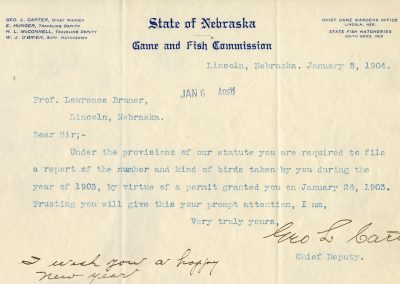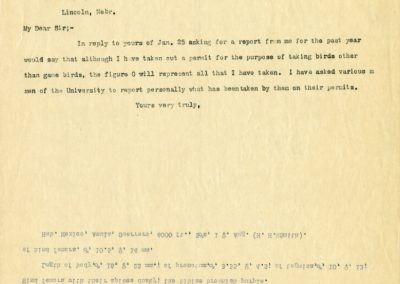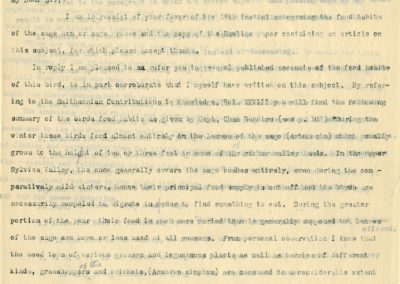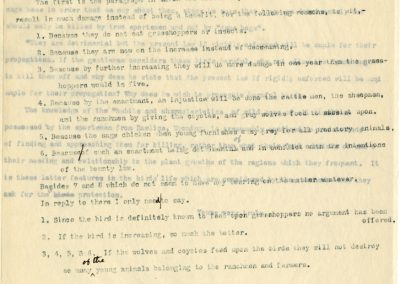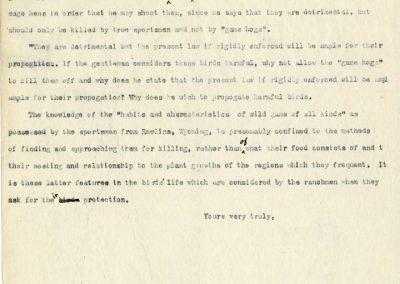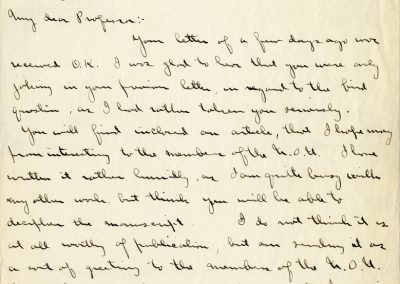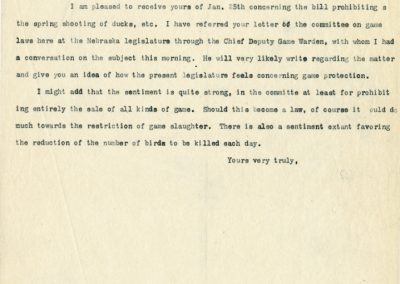Great Nebraska
Naturalists and ScientistsNebraska Ornithologists’ Union
Letters, 1904, January
1904, Jan. 5
Geo. L. Carter, Chief Warden E. Hunger, Traveling Deputy H. L. McConnell, Traveling Deputy W. J. O’Brien, Supt. Hatcheries
Chief Game Warden’s Office Lincoln, Neb. State Fish Hatcheries South Bend, Neb.
State of Nebraska Game and Fish Commission
Lincoln, Nebraska, January 5, 1904
Jan 6 Ansd
Prof. Lawrence Bruner Lincoln, Nebraska.
Dear Sir;- Under the provisions of our statute you are required to file a report of the number and kind of birds taken by you during the year of 1903, by virtue of a permit granted you on January 26, 1903. Trusting you will give this your prompt attention, I am, Very truly yours, Geo. L. Carter Chief Deputy. I wish you a happy New Year
1904, Jan. 6
Lincoln, Nebr., Jan. 6, 1904.
Mr. Geo. L. Carter, Chief Deputy Game Warden, Lincoln, Nebr.
My Dear Sir;- In reply to yours of Jan. 25 asking for a report from me for the past year would say that although I have taken out a permit for the purpose of taking birds other than game birds, the figure 0 will represent all that I have taken. I have asked various men of the University to report personally what has been taken by them on their permits. Yours very truly,
1904, Jan. 21
Lincoln, Nebr., Jan. 21, 1904.
Hon. B. B. Brooks, Gov. Wyoming. Cheyenne, Wyo.
My Dear Sir:- I am in receipt of your favor of the 19th instant concerning the food habits of the sage hen or sage grouse and the copy of the Rawlins paper containing an article on this subject, for which please accept thanks.
In reply I am pleased to refer you to several published accounts of the food habits of this bird, to in part corroborate what I myself have written on this subject. By refering to the Smithsonian Contributions to Knowledge, Vol. XXVIII you will find the following summary of the birds food habits as given by Capt. Chas Bandiro (see p. 107) “During the winter these birds feed almost entirely on the leaves of the sage (Arte[illegible]) which usually grows to the height of two or three feet in some of the richer valley lands. In the upper Sylvies Valley, the snow generally covers the sage bushes entirely, even during the comparatively mild winters, hence their principal food supply is cut off and the birds are necessarily compeled to migrate in order to find something to eat. During the greater portion of the year their food is much more varied than is generally supposed but leaves of the sage are more or less used at all seasons. From personal observation I know that the seed tops of various grasses and leguminous plants as well as berries of different kinds, grasshoppers and crickets, (Amorun simplex) are consumed to a considerable extent during the summer months”.
Dr. Elliot Copes in his Key to North American Birds, Vol II, p.755 says of this bird- “The food is by no means so exclusive as some have supposed, including many kinds of berries and seeds and sometimes consisting mainly of grasshoppers.” Various other prominent ornithologists make like statements concerning the insectivorous habits of the sage grouse.
Referring to the article appearing in the Rawlins Republican, there are several statements which I would like to refer to at least.
The first is the paragraph in which the writer says “And passing such an act would result in much damage instead of being a benefit for the following reasons, to wit.- 1. Because they do not eat grasshoppers or insects. 2. Because they are now on the increase instead of decreasing. 3. Because by further increasing they will do more damage in one year than the grasshoppers would in five. 4. Because by the enactment, an injustice will be done the cattle men, the sheepmen, and the ranchmen by giving the coyotes, and gray wolves food to subsist upon. 5. Because the sage chicken when young furnishes many prey for all predatory animals. 6. Because of such an enactment being detrimental and in conflict with the intentions of the bounty law. Besides 7 and 8 which do not seem to have any bearing on the matter whatever.
In reply to there I only need to say. 1. Since the bird is definitely known to feed upon grasshoppers no argument has been offered.
2. If the bird is increasing, so much the better. 3, 4, 5 & 6. If the wolves and coyotes feed upon the birds they will not destroy so many of the young animals belonging to the ranchmen and farmers. 7. Same as one. 8. Immaterial
My personal experience has been that these birds are exceedingly active in feeding upon destructive grasshoppers and I have watched them numbers of times as they moved about over the landscape in droves, similar to our domestic fowls, picking up these insects to the right and left.
“They are detrimental but the present law if rigidly enforced will be ample for their propogation. If the gentleman considers these birds harmful, why not allow the “game hogs” to kill them off and why does he state that the present law if rigidly enforced will be ample for their propagation? Why does he wish to propogate harmful birds.
The knowledge of the “habits and characteristics of wild game of all kinds” as possessed by the sportsman from Rawlins, Wyoming, is presumably confined to the methods of finding and approaching them for killing, rather than of what their food consists of and their nesting and relationship to the plant growths of the regions which they frequent. It is these latter features in the birds’ life which are considered by the ranchmen when they ask for their protection. Yours very truly,
1904, Jan. 25
University of California College of Agriculture Berkeley, California
Agricultural Experiment Station E. W. Hilgard, Director
Berkeley, Cal Jan 25th 1904
Prof L. Bruner Lincoln
My dear Professor:- Your letter of a few days ago was received O.K. I was glad to hear that you were only joking in your furious letter in regard to the bird question, as I had rather taken you seriously. You will find inclosed an article, that I hope may prove interesting to the members of the N.O.U. I have written it rather hurriedly, as I am quite busy with my other work, but think you will be able to decipher the manuscript. I do not think it is at all worthy of publication, but am sending it as a sort of greeting to the members of the N.O.U. Hoping that you and your family are well I remain Very truly yours J. S. Hunter
1904, Jan. 27
Lincoln, Nebr., Jan. 27, 1904.
Mr. A. C. Griffen, Pierre, So Dak.
My Dear Sir:- I am pleased to receive yours of Jan. 25th concerning the bill prohibiting the spring shooting of ducks, etc. I have referred your letter to the committee on game laws here at the Nebraska legislature through the Chief Deputy Game Warden, with whom I had a conversation on the subject this morning. He will very likely write regarding the matter and give you an idea of how the present legislature feels concerning game protection.
I might add that the sentiment is quite strong, in the committee at least for prohibiting entirely the sale of all kinds of game. Should this become a law, of course it ould do much towards the restriction of game slaughter. There is also a sentiment extant favoring the reduction of the number of birds to be killed each day. Yours very truly,
